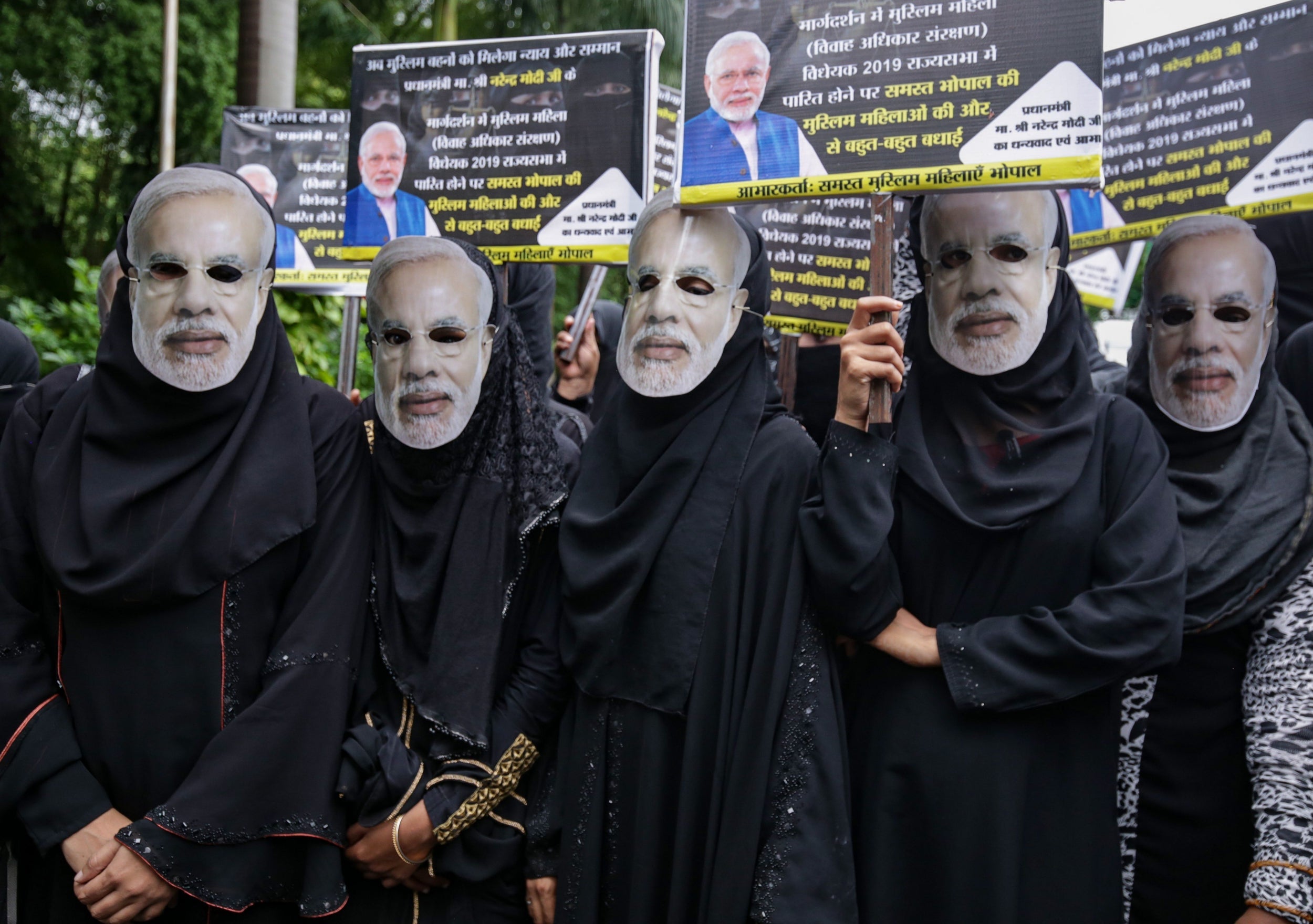Triple talaq: India criminalises Muslim instant divorce
'Passage of this law will create a sense of fear among the community instead of providing relief to Muslim women'

India’s parliament has passed a bill to criminalise the Islamic instant divorce known as “triple talaq”, a move which the government said was to empower women but which has been criticised by members of the Muslim community.
Justice minister Ravi Shankar Prasad said the bill was necessary as hundreds of instances of the practice were still being reported each month, despite a ruling of the Supreme Court two years ago that it violates the constitutional rights of Muslim women.
The practice stems from Muslim Personal Law (Shariat), which stipulates that a man may divorce his wife by saying “talaq”, the Arabic word for divorce, three times. Recent years have seen cases of men who did so via texts and WhatsApp messages.
The ruling Bharatiya Janata Party (BJP) has been trying to pass a bill making it a criminal offence to practice triple talaq for more than a year, but has failed to do so due to strong opposition in the upper house of parliament, the Raj Sabha.
But on Tuesday, with the opposition split, the government somewhat unexpectedly passed the bill by 99 to 84 votes. It passed comfortably last week in the lower house, where the BJP has a strong majority.
Mr Prasad told reporters: “This is a historic day, the injustice that was going on with Muslim women, India's parliament has given them justice.”
Indian General Election 2019
Show all 10Many of the country’s 170 million Muslims opposed the bill, and saw its politicisation in campaigning for May’s general election as evidence that the BJP was an anti-Muslim party.
Triple talaq is condemned by most mainstream Muslim groups in India as inherently patriarchal. It is only available to men, with women required to seek permission from their husbands if they want a divorce, and does not feature in the Quran.
Nonetheless, there is general consensus that it is a civil matter which should have been reviewed by community leaders rather than outlawed by the government.
Shabnam Hashmi, a leading social rights activist, told The Independent the bill was unnecessary because the Supreme Court had already “declared triple talaq invalid”, and that its passage was instead “part of the larger agenda of majoritarian politics”.
“This is the first time in India’s history that a personal law is being criminalised,” she said. “It has in fact made the patriarchal, conservative forces within the Muslim community stronger, as they have started mobilising women [in the name of] ‘save sharia and save Islam’.”
Asaduddin Owaisi, an MP from the opposition All India Majlis-e-Ittehadul Muslimeen party, said the BJP, a Hindu nationalist party, was targeting minority Muslims rather than focussing on problems with the majority Hindu society.
The bill means men can be sent to prison for up to three years for attempting triple talaq.
But it makes no consideration of how a husband who is jailed would continue to provide maintenance for the wife and family, said Dr Razia Patel, an activist and academic specialised in Muslim women’s rights.
“The main question is whether this will provide justice to Muslim women. Clearly the answer is no,” she told the Indian Express. “For several years the BJP has been talking about a uniform civil code, but now they have made special laws for the Muslim community,” she said.
“Passage of this law will create a sense of fear among the community instead of providing relief to Muslim women.”
The All India Muslim Personal Law Board, a key national body for representing Muslims as well as specifically dealing with shariat, said it was considering challenging the law in the Supreme Court. It has condemned triple talaq in the past and issued advisories to Islamic leaders not to grant instant divorces, but believes criminalisation has been used to "make a political point of it".
“We still have a number of legal options left with us,” said board member Kamal Faruqui. “The constitution is in danger,” he added, an apparent reference to the secularity of the country guaranteed by the Indian constitution.
And Ghulam Nabi Azad, a leader within the main opposition Congress party, told the Associated Press that the law was inherently discriminatory because no other religion in the country was being threatened with jail terms for irregular divorce practices.
The bill will become law when it is signed by the president, Ram Nath Kovind, who tweeted on Tuesday that it was “a milestone in the quest for gender justice; a moment of satisfaction for the entire country”.
Passing the bill in the Raj Sabha, where he does not command a majority, represents one of the first major legislative victories for Narendra Modi since he cruised to a second term in a landslide election win.
Party officials described how it took a “meticulously planned” strategy to whip BJP members and divide the opposition, while also taking advantage of a number of key absences from the chamber on the day.
A motion to have the bill referred to a select committee for further consultation was also rejected by 100 votes to 84.
Shortly after the bill passed, Mr Modi took to Twitter to celebrate. He thanked “all parties and MPs who have supported [its] passage in both Houses of Parliament”.
“They have risen to the occasion and this step of theirs will forever be remembered in India’s history,” he said.
Subscribe to Independent Premium to bookmark this article
Want to bookmark your favourite articles and stories to read or reference later? Start your Independent Premium subscription today.

Join our commenting forum
Join thought-provoking conversations, follow other Independent readers and see their replies